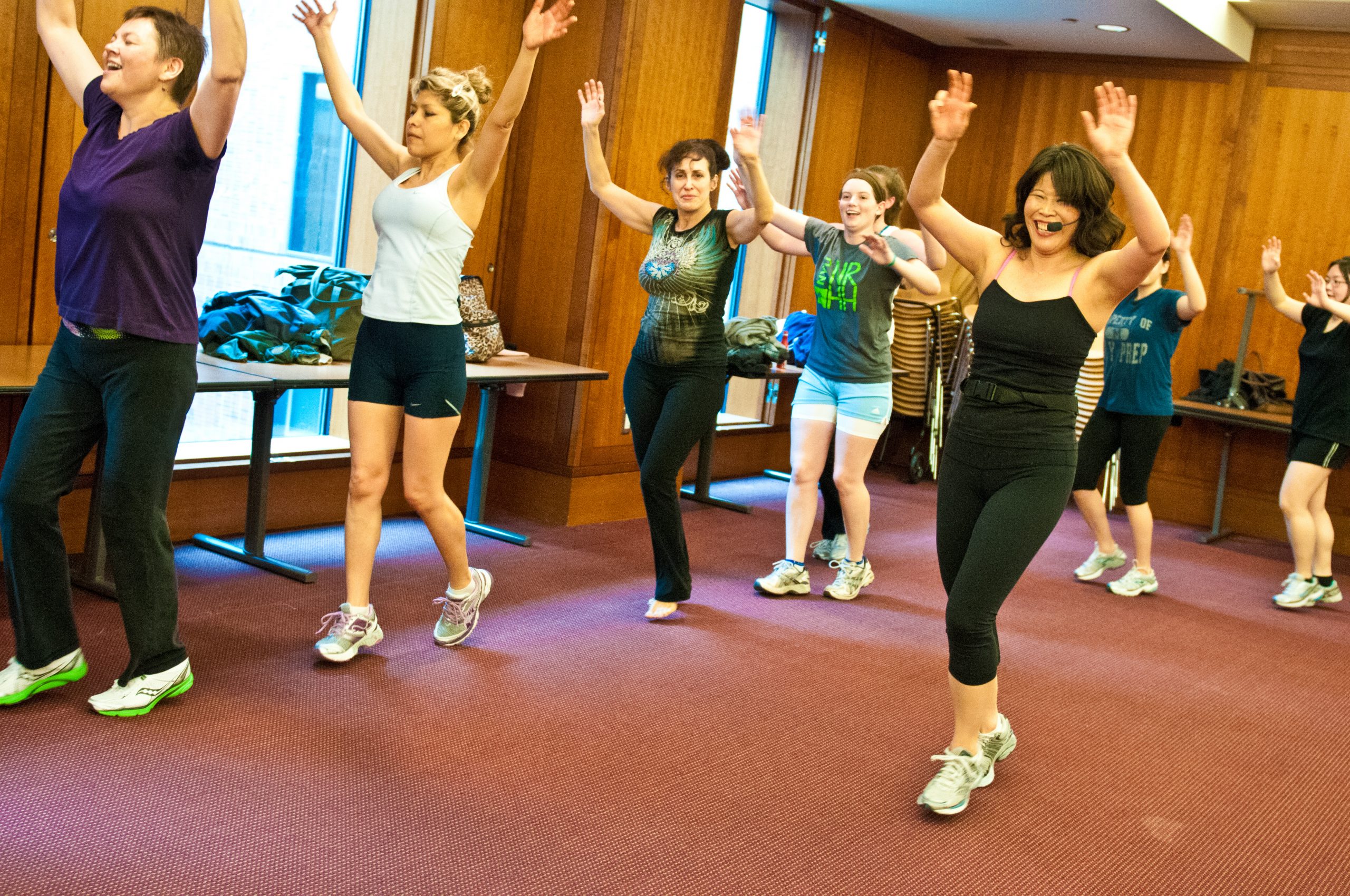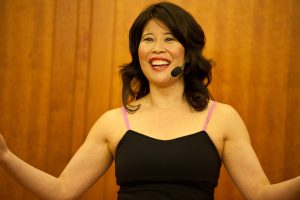 CNS 2021: Q&A with Wendy Suzuki
CNS 2021: Q&A with Wendy Suzuki
About 15 years ago, Wendy Suzuki was on a mission. She wanted to lose 25 pounds and began a regular gym and diet regimen. As she worked out more, she saw a big shift in her mood and memory. At the same time, her father suffered a sudden and debilitating loss in his cognitive abilities. One day, he couldn’t find his way home from a café he had driven to every day for the previous 30 years.
“This smart engineer couldn’t remember how to get home,” Suzuki recalls. “It was a Black Mirror Effect: Everything that was improving in me was declining with my father.”
A cognitive neuroscientist who studied the hippocampus, Suzuki became motivated to study these effects. Over the next few years, she transitioned her research focus from understanding the neurophysiology of memory to studying the link between exercise and cognition. Now her lab at New York University examines the neural mechanisms underlying exercise-related changes in cognitive performance across different populations and age groups.
At the CNS annual meeting this coming March, she will present the keynote lecture on new insights that could help inform how people use exercise as a tool for cognitive health, especially in protecting against aging and dementia. CNS spoke with Suzuki about these new findings, what it’s been like to study exercise during the COVID-19 pandemic, advice she has for early-career scientists, and exciting trends she sees in the field.
CNS: What are you most excited to be presenting in March?
Suzuki: I’m excited about the new data that I’ll be presenting that uses EEG to study the cognitive effects of long-term changes from exercise. This will be the first time I am presenting the fully analyzed data, which looks at two data sets for healthy 30- to 50-year-olds:
- What happens if you are lower fit, not regularly exercising, and then you make that effort to change your cardiorespiratory fitness? What does that do to your cognition?
- What if you are mid to high fit and already have that exercise bug in you? Does exercise still benefit cognition?
For each group, we took baseline EEG readings and had them perform cognitive tasks before they started the exercise intervention, which lasted for 12 weeks. The low-fit group exercised 3 times a week, and the higher-fit group was either put in a low-activity intervention once a week or did 4-7 workouts a week. After finishing the exercise regimens, they came back for more baseline cognitive testing and measurements.
 CNS: In addition to the new data, what else will you discuss in your keynote?
CNS: In addition to the new data, what else will you discuss in your keynote?
Suzuki: While I myself am not currently looking at mechanisms for exercise-induced brain changes, there are some really exciting studies looking at some pathways — one that involves liver and one that involves muscles. These are helping us understand exactly what it is about moving our peripheral body that changes our brain.
It’s not in the void anymore; researchers are bringing in all these key elements to get to the point where it is helpful for someone. Along those lines, I am going to mention a company I am CEO of that is using all this broader research to be able to help individuals. We want to provide research-based and data-based guidance. It’s still in the early stages but a really exciting part of my research.
CNS: You mentioned the challenge in getting enough data for exercise studies. Can you talk about that?
Suzuki: Anybody doing exercise studies will tell you it’s easy to get people to sign up for an exercise study, especially if you say you’ll give them free gym membership for 3 months. You get lots of people and enthusiasm but then an 80-percent drop off after the first week. Behavioral change is difficult. These studies hinge on people changing their behavior and sticking with it, and that’s challenging. So, we have to be creative. We go to places where people are already invested, and we are always thinking of new ways to engage people.
The data I’ll be presenting was collected pre-COVID. The high-fit group was recruited through a collaboration with a spin studio in Austin, TX. The study with low- to mid-fit people was also through a spin studio, but in New York City. Spin is popular and engaging but also very hard.
It’s hard to get people to join studies like this and exercise enough that their cardiorespiratory fitness changes, so I am excited to be able to present the results. We are still analyzing it all now but will have the full findings by March.
CNS: How has COVID affected these studies?
Suzuki: The studies I am doing now are all taking advantage of the big boom in online fitness, as there are few places you can go to the gym right now. Early in the pandemic, I noticed all of these great online fitness companies offering 5 weeks for free, so I signed up for all of them (and I lost 5 pounds in the first couple months!). This is how we ended up pivoting. We realized so many people are working out online, which can work with our online research platform.
The new studies are also focusing on mood. A lot of what I have learned from exercise is its powerful effect on mood, including anxiety and depression. There isn’t a much bigger problem society has, especially among college-aged adults, and it was a problem before pandemic and is even greater now. We are working to expand studies of mood beyond exercise to include interventions like mindful conversations, chair yoga, and breath work, which are easily accessible and easily implemented online. I am applying the pivoting approaches I learned as an entrepreneur to my lab and research writ large; it’s really opened up more worlds and more directions than I was aware of.
CNS: What trends in the field are you most excited about?
Suzuki: I’m particularly excited about the coalescing in the field around the acceptance that there is hippocampal neurogenesis in humans. There had been a big rift, but recent papers show that even in the 9th decade of life, there’s evidence for hippocampal neurogenesis. At the same time, there is good evidence that BDNF [a protein that plays a significant role in neurogenesis] increases with exercise.
So, we are getting closer and closer to a new model that opens up some really exciting pathways for both cognitive enhancement in healthy people and for people living with dementia. We have a real epidemic of dementia in the population of aging adults. The most exciting promise for long-term regular exercise is the protective aspect for the brain. We’re not going to cure Alzheimer’s or Parkinson’s disease with exercise but can strengthen areas of the brain vulnerable to aging. We need all of the tools at hand to address aging and dementia, and if we can use exercise strategically, that is the golden ticket of exercise.
Before my work on exercise, I was a neck-up neuroscientist. What this new work in exercise has emphasized is that the brain, your cognition, is connected to your body. There is a really powerful 2-way street.
CNS: What advice do you have to researchers considering a shift in their research like you did?
Suzuki: I think that #1, it’s ok to admit that it’s scary because it is scary. And # 2 it’s important to realize that many of our role models start in one field and stay in that field. That’s wonderful, as their longevity in the field adds to their knowledge base, but it doesn’t give us the ability to see that it’s possible to make a shift.
It can happen; I did it late, which meant I was known for one thing and then left. But on the other hand, I got to re-experience the excitement from when I was a first time assistant professor trying new experiments for the first time, but I was much smarter and knew more, so I took advantage of that. I am not advocating changing fields willy nilly from here to there; science doesn’t work that way. You need to establish expertise. My long background in anatomy, neurophysiology, behavior has brought something new and different and inspired to the new direction that I chose.
CNS: Any tips for starting up exercise in the pandemic?
Suzuki: Don’t try to do a 1.5-hour cardio bootcamp right away. Start small and make it fun. Now, we have so many more choices to work out online, many of them free, in yoga, dance, kickbox, etc. It’s very empowering for me to know that I can do my workout right over there on my living room floor. I don’t have to wear anything special; it’s really freeing. Even 5 min a day will help a tiny habit grow.
CNS: What do you most want CNS members to take away from your upcoming keynote address?
Suzuki: An important message is the appreciation of the importance of the brain-body connection. Before my work on exercise, I was a neck-up neuroscientist. What this new work in exercise has emphasized is that the brain, your cognition, is connected to your body. There is a really powerful 2-way street. Moving your body is so important for your cognition. We’ve evolved to move, despite that most of us are sitting in the same seat for 12 hours a day, and our brains are suffering from that change in habitat that we have created for ourselves. I love that reminder that I get for myself, and I think it’s an important reminder for all scientists who can get stuck in analyses and on screens too long.
-Lisa M.P. Munoz



Leave a Reply
You must be logged in to post a comment.